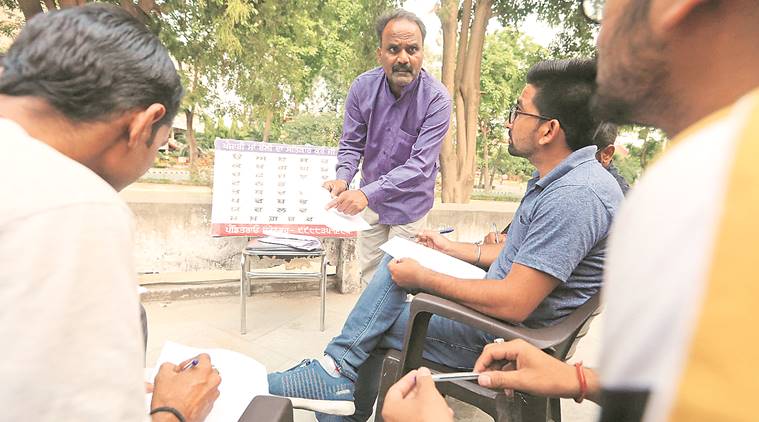
“APNA DHYAN rakhya karo (Take care of yourself),” Dr Vishwanath tells a patient at an OPD inside the Post Graduate Institute of Medical Education and Research (PGIMER) in Chandigarh. The doctor’s Punjabi is fluent enough for him to be tagged as a local. Except that he’s not. Vishwanath, a senior resident in neuroanaesthesia, hails from Bidar in Karnataka and joined the institute in 2013.
At the institute, there are over 60 doctors and nurses from the south, who communicate with their patients in Punjabi now. And all of them have one man to thank for helping them break the language barrier with their patients: Punditrao Dharenavar, 43, assistant professor of sociology at the Post Graduate Government College in Chandigarh’s Sector 46.
Dharenavar, who moved from Bidar to Chandigarh in 2003, started holding classes for the doctors around three years ago, sometimes under a tree on the campus, often in the canteen, with big sheets of Punjabi letters placed on a chair. Today, the lessons have spilled over to WhatsApp, too, in a group called ‘Punjabi Ma Boli’.
“I started with a batch of 16 doctors in January 2016. Then, a need was felt to teach the language to nurses from the south, too, and I started teaching them as well. Earlier, I used to conduct classes every day, but the doctors have a hectic schedule so now I teach only on Fridays, Saturdays and Sundays,” says Dharenavar, who has also authored a book for the doctors, ‘Sat Sri Akal Doctor Sahib’.
“After attending these classes for a year, I was able to read and write in Punjabi. I have also started speaking to my patients in Punjabi. The first thing I ask them is, ‘Ki haal chaal’ (How are things), which puts them at ease,” says Shinto Shaji, a nursing officer in the Department of Nephrology, who hails from Munnar in Kerala.
For the patients, the Punjabi classes for doctors and nurses have come a “big relief”.
Ravinder Singh, who visited the emergency ward last week with his critically ill nephew, said he was “pleasantly surprised” when he found that the doctor, from Karnataka, was able to read the medical reports that were in Punjabi. “I had begun to panic as no one seemed to know how to read Punjabi when this doctor came and read them after joining the letters painstakingly. I knew I was in safe hands. For me, he was a Godsend,’’ says Singh, folding his hands in gratitude.
Jaspal Singh, from Amritsar, was in for a similar surprise at the Department of Internal Medicine. “I thought the doctor was a Punjabi although his accent was different. Then, I got to know that he was from the south. It felt so good and I instantly told him about my complications in detail,” he says.
Dr Vishwanath says the look on the faces of his patients when he converses with them in Punjabi is “priceless”. “They really appreciate it and I can see them opening up instantly. I feel it’s my duty to learn Punjabi when so many of my patients come from the state,” he says.
Dr Muniraju Maralakunte, a senior resident in the Department of Radiodiagnosis who hails from Bengaluru, is another of Punditrao’s students. “I haven’t been able to spare much time for the classes, but have learnt enough to converse with patients. Punditrao’s enthusiasm is infectious. Also, he concentrates on sentences involving medical terms.”
Dharenavar’s love for Punjabi goes beyond the PGIMER, though. He has translated several scriptures, such as ‘Jap Ji Sahib’, ‘Sukhmani Sahib’ and ‘Zafarnama’, from Punjabi to Kannada, and hymns from Kannada. In 2016, he filed an appeal in the Punjab and Haryana High Court against the “pollution” of the language by Punjabi pop singers.
But an unintended fallout of his classes has been that the doctors he taught are now fans of Punjabi pop. “I love listening to songs by Sharry Mann, Parmish Verma and my favourite, Diljit Dosanjh… Punjabi pop is my stress buster,” says Maralakunte. And Dr Thanseer, who was a senior resident in the Department of Nuclear Medicine before moving back to Kozhikode, still can’t stop talking about his “enduring passion for the songs of Honey Singh and Guru Randhawa”.